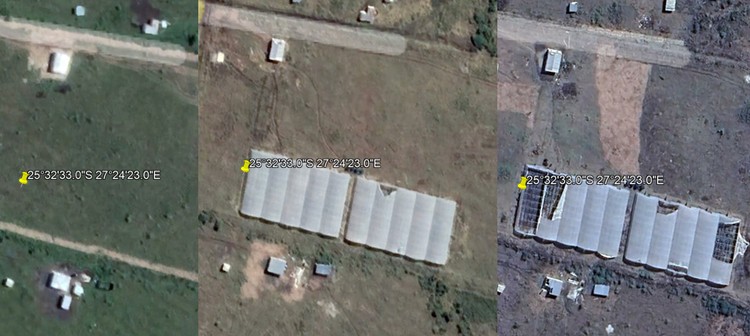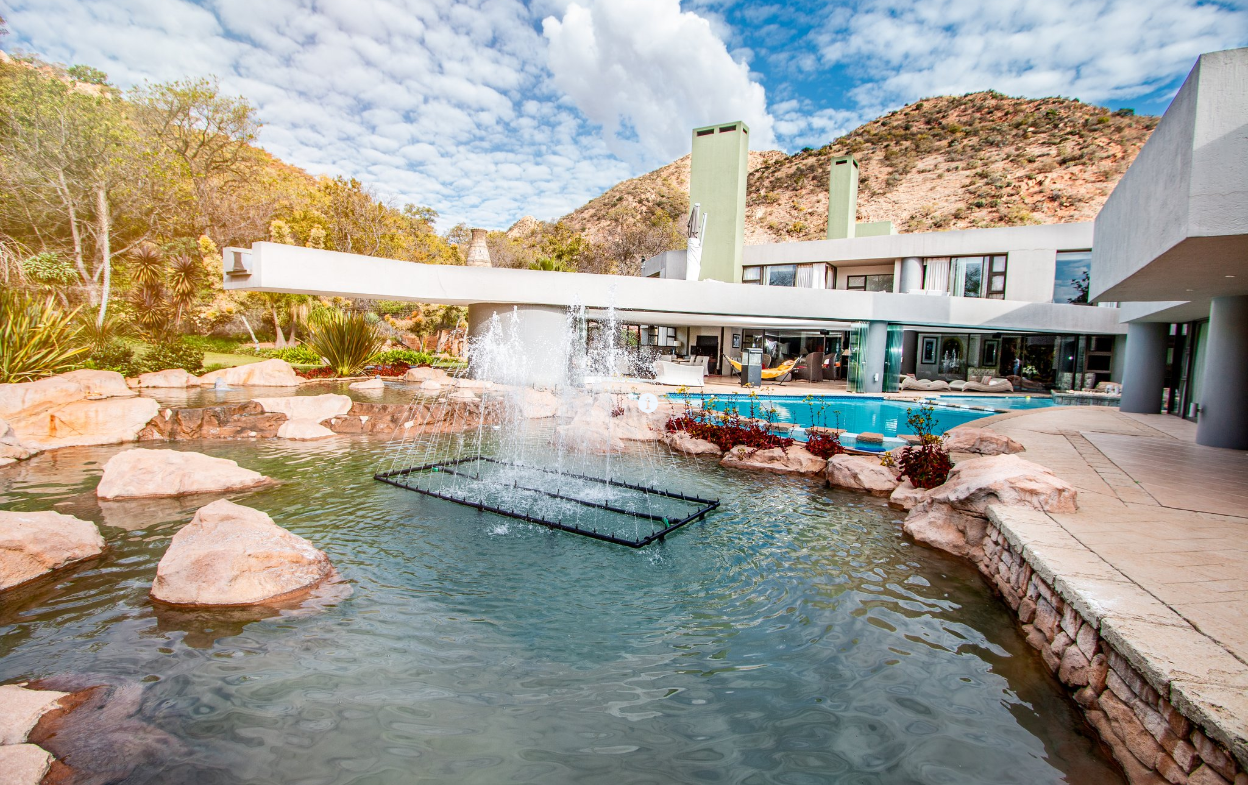
19 August 2025
The Special Tribunal has ruled in favour of the Special Investigating Unit. William Huma, a former board member of the National Lotteries Commission, used R21-million meant for good causes for personal gain. The money was put into Huma’s farm. GroundUp previously reported on these screen grabs from Google Earth, which show how the farm deteriorated. The three photos from left to right were taken in 2021, 2022 and 2023 respectively. In the 2021 photo the grow tunnels don’t exist. In 2022, they look completed. In 2023, they are falling apart.
Former National Lotteries Commission board member William Huma has been ordered by the Special Tribunal to pay back more than R21-million.
The Special Tribunal has ruled that a R16.5-million grant awarded by the National Lotteries Commission (NLC) to Samaritan Initiative NPO, and a R4.7-million payment to Reagile NPC, are unlawful and invalid.
The organisations were linked to former NLC board member William Huma. The Special Tribunal found that Huma caused the NLC to suffer damages of more than R21-million, citing egregious misconduct, negligence, dishonesty and violations of fiduciary duties.
Huma and the two organisations have been ordered to repay the money.
The Special Investigating Unit has already started a process to recover the full amount. Spokesperson Kaizer Kganyago said the judgment by tribunal judge Margaret Victor was “landmark”. He said it was the first judgment to set aside grant funding in the ongoing SIU investigations into corruption within the NLC.
The investigation started in 2020, based on allegations that NLC board members had diverted funds meant for good causes to entities they either controlled or were linked to, and splurged on expensive properties and the like.
Kganyago said the SIU had filed 18 review applications concerning NLC grants seeking to set them aside. The total value of the grants was more than R320-million. More applications were expected to be filed, he said.
In February 2025, the tribunal issued a preservation order for R10-million emanating from the sale of a luxury property belonging to Huma, pending the outcome of the review application.
While Huma has appealed the preservation order, Judge Victor, in her recent ruling in the review application, said she believed that the review could not be held up because of that.
She said Huma’s conduct, while he served on the board of the NLC, had been brought to the SIU’s attention by a whistleblower.
“The SIU claims that the Samaritan Initiative was hijacked by its current directors on the advice of Huma. Reagile was also acquired as a shelf NPC [non-profit company] at his direction.”
“The modus operandi of Huma was to use the organisations as a vehicle to obtain funding from the NLC. The funding granted to the Samaritan Initiative (R16.5-million) was to be used to empower women and children in villages in the Bojanala District, to provide sustainable jobs and empower rural communities.”
“Ultimately the grant was used to install buildings and chicken farming equipment on a farm owned by Silverlite, a farm owned by Huma’s niece.”
Judge Victor said Huma himself later became its sole director.
She said the “chicken business” failed, the farming equipment was looted, and what was left had little value. The SIU decided not to seek a preservation order for these items.
Regarding the Samaritan Initiative, one of its original members was traced, who said he did not recognise any of the names of the current directors. He said he had never applied for funding.
The SIU said Reagile had two directors, one who was Huma’s wife and the other his nephew.
The purpose of the grant to Reagile (R4.6-million) was for a community upliftment project.
“There is nothing to show for that project either,” Judge Victor said.
In opposing the setting aside of the grants, Huma raised many technical issues. But in the main, he said he had done nothing wrong, and that his conduct was “above reproach”.
Huma had submitted that, as a board member, he was not involved in grant funding applications, and he had not received any money or benefit from the grants.
But the NLC had hired an independent firm of attorneys to investigate the allegations, which found that Huma had contravened the Lotteries Act by using his position as a board member for his personal gain and that of his relatives.
He had refused to attend a consultation and had nothing to say in his defence.
Judge Victor said the NLC contended that the undisputed paper trail was clear.
“The NLC submitted that the evidence of three witnesses all state that they applied for funding on the advice of Huma. He has not been able to gainsay this,” she said.
She said it was not disputed that Huma was a member of the board when the grants were awarded; that he was the sole director of Silverlite at the material time; that he, through Silverlite, bought the farm with the grant funding given to the Samaritan Initiative; that his relatives were members/directors of the Samaritan Initiative and Reagile; that the two organisations received funding of more than R21-million in grants and that neither “reached their mission statement goals”.
She said Huma’s defences were either bare denials or “red herrings”.
In finding for the SIU, she said Huma’s dishonest and unlawful conduct justified an order that he repay monies which could not be recouped from the Samaritan Initiative and Reagile.
On the issue of costs, she said Huma’s conduct had been reprehensible.
She described Huma as a non-practising advocate, who is legally trained and “must have been aware that his conduct was contrary to the prescripts of the Constitution”.
“His pleaded defences were bald, obtuse and unmeritorious,” she said, ordering that the costs had to be paid on a punitive scale.
She said the proceeds of the sale of Huma’s Waterkloof property would remain under preservation until that matter was finally resolved.
Kganyago, in a statement, said the SIU could now launch execution proceedings to recover that money in light of the Special Tribunal’s ruling.
He said the SIU had also preserved a farm in the North West and a boutique hotel in Rustenburg belonging to Huma and linked to NLC funds. This was linked to another investigation.
“As part of implementing the order (by Judge Victor), the SIU will conduct auctions for the properties in question. The proceeds generated from these auctions will be directed back to the NLC to support projects aimed at uplifting communities.”
Google satellite view of Huma’s luxury house in North West which was partly paid with money that was supposed to be used to build an old age home. (This was not the subject of the Special Tribunal review described in the above article.) Image from Google Maps

This above property was subsequently turned into a boutique hotel using Lotto money. Photo: Facebook page of the hotel